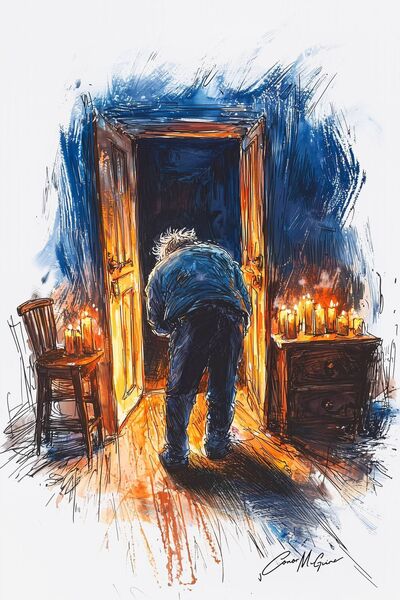A modern tale of darkness and digital detox

The modern power cut creates a special kind of chaos - watching people desperately trying to preserve their phone battery life as if it were the last drop of water in a desert. Picture: iStock
In the wake of Storm Darragh's furious assault on our Emerald Isle, thousands of households found themselves thrust into an involuntary experiment in time travel, catapulted back to an era before the digital umbilical cord tethered us to our perpetual feed of electrons and entertainment.
There's something profoundly humbling about nature's ability to render our sophisticated modern existence into nothing more than an elaborate collection of lifeless black mirrors and silent screens. As I attempted to read by candlelight, I couldn't help but marvel at how quickly our homes transformed from smart to dumb the moment the power grid decided to take a sabbatical.
Gone are the gentle hums and whirs that form the background symphony of modern life - the refrigerator's reassuring purr, the microwave's eager ping, the dishwasher's soothing slosh. Instead, we're left with an acoustic void filled only by our increasingly desperate sighs as we repeatedly flick light switches out of sheer muscle memory, like laboratory rats still hoping for their pellet reward.
The modern power cut creates a special kind of chaos - watching people desperately trying to preserve their phone battery life as if it were the last drop of water in a desert. We've become digital bedouins, wandering from coffee shop to coffee shop in search of that most precious of modern commodities - a working power outlet.
Without our usual electronic distractions, we're forced to confront the shocking reality that we've forgotten how to entertain ourselves without pixels. Board and card games are excavated from dusty cupboards, books are rediscovered, and actual face-to-face conversations emerge like shy creatures venturing out after a storm. It's as if we're all suddenly starring in an unscripted reality show called 'Surviving the 20th Century'.
The kitchen, that gleaming temple of modern convenience, becomes a puzzle room worthy of an escape game. How does one heat soup without a microwave? Can you make toast with a candle? These are the philosophical questions of our time. The lucky ones who remembered to buy matches before the storm feel like apocalypse preppers who can finally justify their paranoia.
Yet there's an undeniable romance to these forced digital detoxes, these temporary returns to a simpler time. In the candlelight, we all look ten years younger (though this may be less about the lighting and more about our screens no longer being able to remind us how tired we look).
In these moments of enforced simplicity, we discover forgotten talents and resurrect abandoned hobbies. Someone resurrects a dusty guitar, and it suddenly becomes the evening's entertainment. Initially horrified at the prospect of life without YouTube, children rediscover the joy of shadow puppets and blanket forts. There's something wonderfully apocalyptic about it all - a sense that we're all in this together, united in our shared technological deprivation.
Time itself moves differently without our usual digital markers. Minutes stretch into hours as we realise just how much of our day is usually spent in the warm glow of screens. The dim daylight becomes our clock again, its strength in the sky more relevant than any digital display. Conversations last until they're finished, not until the next notification interrupts.
The darkness brings peculiar challenges for those born after the year 2000. They who have spent their short lifetimes cultivating their personal brands on Instagram suddenly find themselves unable to document candlelit dinners and analogue adventures. It's like being temporarily excommunicated from the digital church of social media. The question arises: If you can't post about your power cut experience, did it really happen?

As the hours stretch on, we begin to notice things we usually miss in our electrically illuminated lives. The sound of rain and wind on windows without the competing hum of appliances, the strange shadows cast by flickering candles. Our homes become unfamiliar territories to be explored anew, like mystery tours of our own making.
The power cut also reveals the hidden hierarchies of our electronic dependencies. The laptop battery dies first, followed by the tablet, and then the phone is carefully rationed like wartime supplies. Those with portable power banks suddenly achieve the status of minor deities, dispensing electrons to the desperate masses with benevolent magnanimity.
In our powerless state, we're forced to confront just how many aspects of our lives we've outsourced to electricity. Even simple tasks become complex puzzles. Making coffee becomes a survival skill worthy of Bear Grylls, and reading by candlelight makes us appreciate why Victorian literature was so verbose - they were probably just killing time until sunrise.
As the wind continues to howl outside and the power company's estimated restoration time keeps shifting like a mirage, we're left to contemplate our electronic dependence. Perhaps Storm Darragh had done us a favour, forcing us to remember that we existed before WiFi, survived before Spotify, and somehow managed to tell time before our phones did it for us.
But the charming nostalgia of candlelit evenings loses its lustre faster than ice cream in a defunct freezer. By day two, your home becomes less Jane Austen novel and more amateur ghost hunter expedition as you stumble through the darkness, collecting bruises from furniture that seems to have developed a vendetta against your shins. The romantic solitude of disconnection transforms into a peculiar form of madness, where you find yourself talking to yourself and negotiating with your cold shower as if it might suddenly decide to heat itself through sheer force of will.
Your carefully curated candle collection, once saved for special occasions, now stands decimated like a waxy battlefield, while you've developed a peculiar talent for finding every single toe-stubbing opportunity in your formerly familiar home. The final straw isn't the cold coffee or the warm beer – it's the dawning realisation that your hair hasn't looked this dishevelled since your teenage goth phase, and there's not even enough light to properly appreciate the chaos in the mirror.
The perils of powerless living multiplied exponentially as I attempted to navigate my suddenly treacherous domicile. In what can only be described as a slapstick routine worthy of Charlie Chaplin, my evening reached its comedic zenith when I performed an interpretive dance with a potted plant. Our unexpected pas de deux ended with the pot unturned across the front porch like a fallen soldier, while my bedroom slippers – faithful companions through countless midnight snack raids – chose this moment for mutiny. The left one abandoned ship into the inky darkness, while the right, in a show of solidarity, launched itself into the shrubbery. Thus de-slippered, I performed an ungraceful finale, sprawling across my car's boot like a starfish having an existential crisis.
And then, like a divine benediction, the power returns and the gentle hum of electricity courses through the house, each appliance chirping back to life like electronic songbirds greeting the dawn. The refrigerator's steady purr sounds suspiciously like laughter at my expense, while the microwave blinks its clock mockingly, demanding to be reset.
As the bulbs flicker and surge into brilliance, I stand in my dishevelled glory – sporting a new collection of bruises, wearing my retrieved slippers – a humble testament to how quickly we modern humans devolve without our precious electrons. In this moment of illumination, I realise that while I may have survived my brief sojourn into the 18th century, I'll never make it as an Amish romance novel protagonist. Thomas Edison, wherever you are, I apologise for every unkind word I've ever uttered about your invention – though I still maintain the cylindrical phonograph was a bit of self-indulgent showing off.




